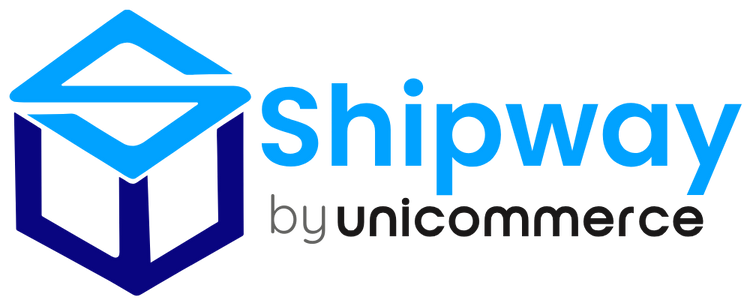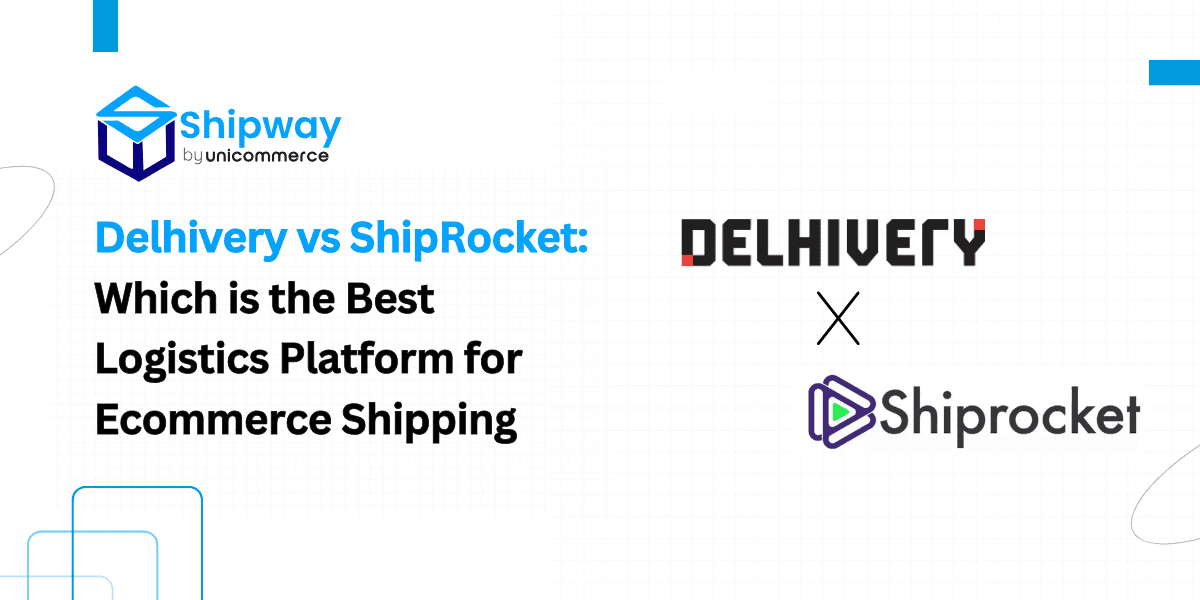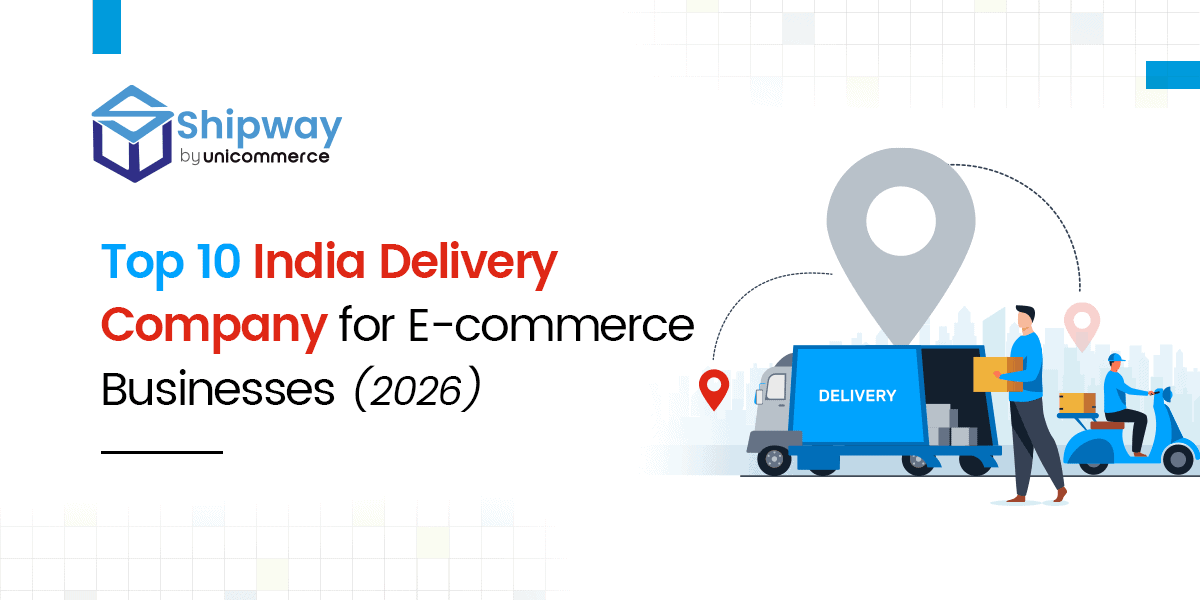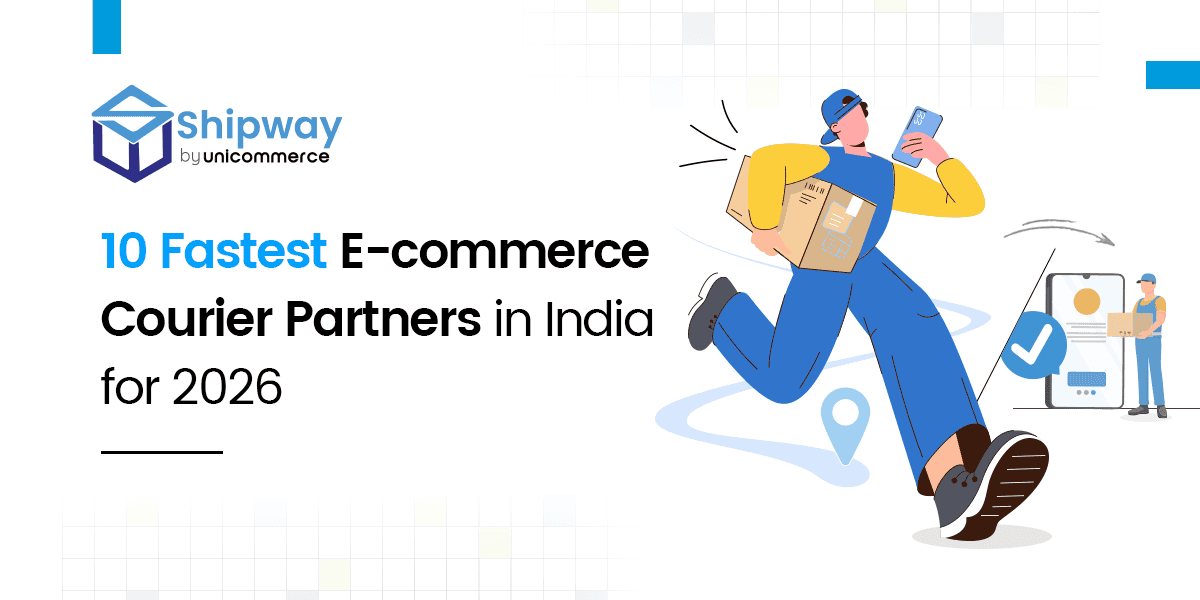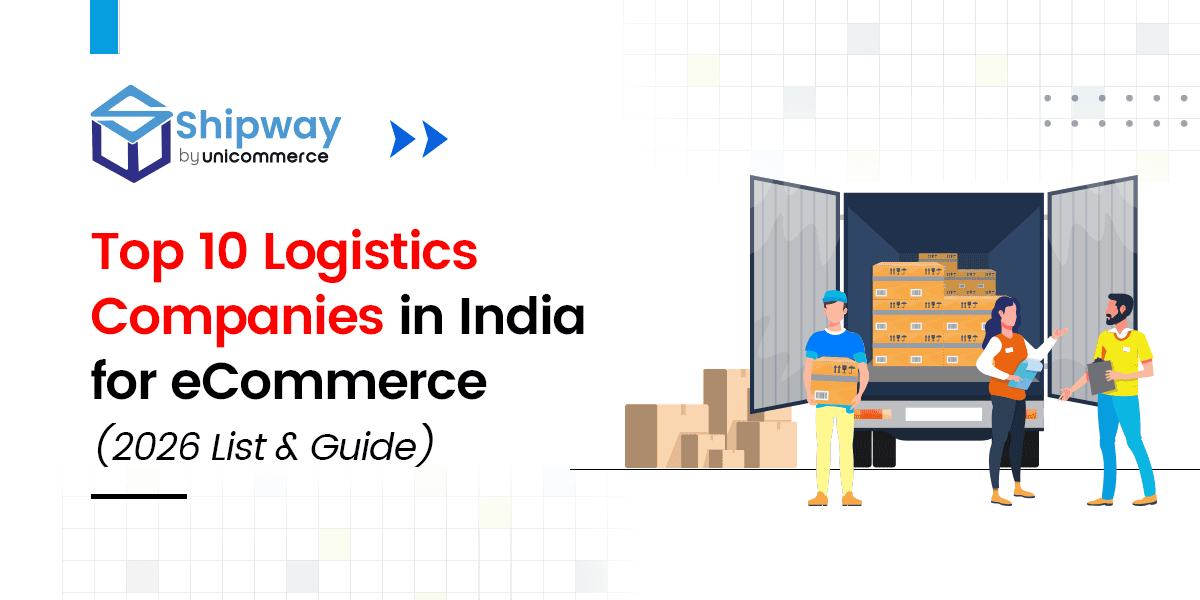In the past couple of years, the Indian logistics industry has witnessed a significant transformation, as the popularity of ecommerce has grown multifold across towns, cities, and rural areas. To support this growth, two major players, Shiprocket and Delhivery, have built distinct business models and served different tiers of customers
Both have built strong operational networks, but their strengths lie in different areas. ShipRocket primarily focuses on helping small to mid-sized businesses manage their shipping through a multi-carrier aggregator setup. It gives sellers the ability to choose from multiple courier partners based on cost, speed, or location. Delhivery is known for its large-scale logistics infrastructure and deep partnerships with enterprise-level clients. It provides scalable logistics solutions under its operations.
A key difference in approach lies in the aggregator model vs the carrier model. Aggregators like ShipRocket and Shipway act as a technology layer that integrates multiple courier companies under one platform. This allows merchants to access a wider delivery network and make flexible choices without having to integrate each carrier individually. On the other hand, carriers like Delhivery own and operate their logistics network. They manage everything from pickup and warehousing to last-mile delivery. This provides more control over service quality and timelines, but may lack the flexibility of multiple options.
As online selling continues to grow, businesses need reliable fulfillment options that suit their order volumes, integration preferences, and customer reach. While ShipRocket appeals to sellers looking for flexibility and aggregator-based support, Delhivery appeals to those who rely on a full-scale logistics partner for ground-level distribution and warehousing.
This comparison looks at core features like shipping reach, tracking accuracy, integrations, support quality, and pricing structure. These help merchants align with the service that matches their specific goals. For ecommerce companies shipping 50 orders a week or 5,000 a day, understanding what each platform delivers can help in making the plan better. Let’s look at where each provider fits in today’s eCommerce fulfillment scene.
Shiprocket vs Delhivery vs Shipway: Detailed Comparison Table
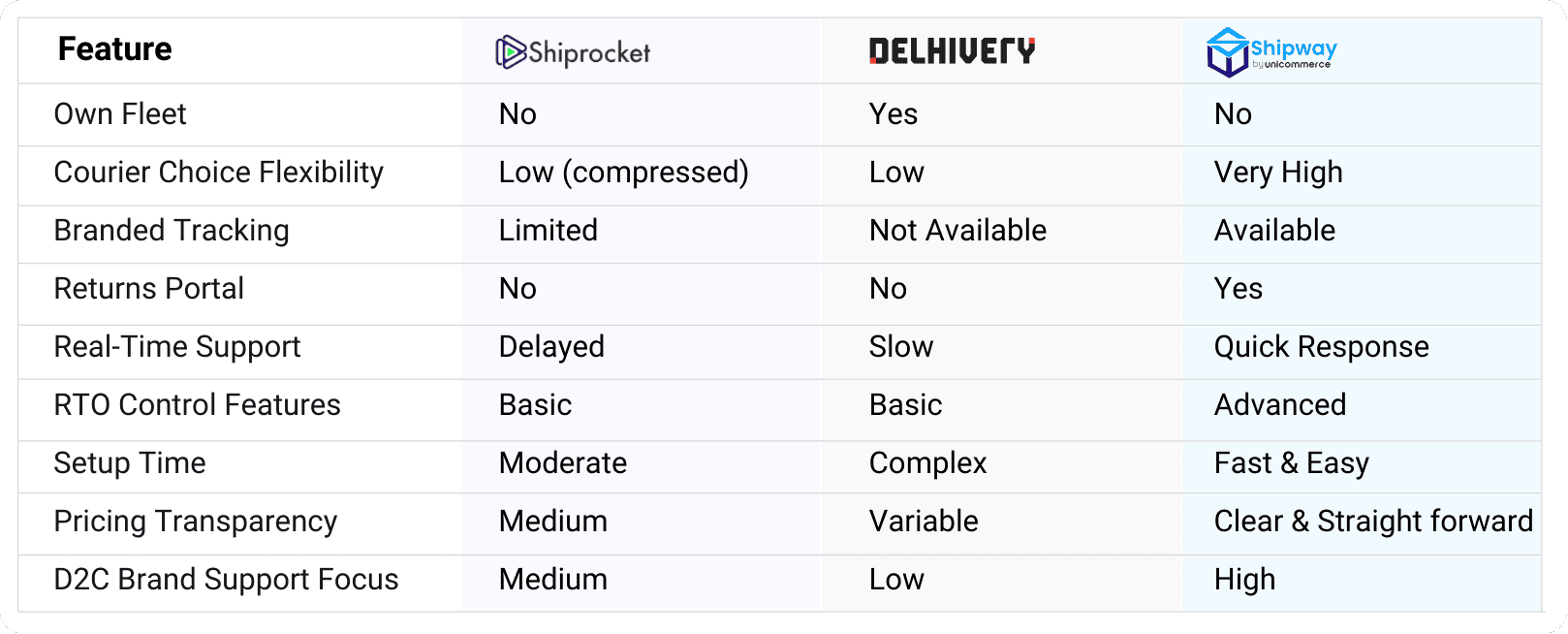
Background and Company Vision
ShipRocket
ShipRocket was founded in 2017 and targets small and medium-sized online sellers to manage order shipping with ease. It acts as a technology aggregator that helps in connecting the sellers to different types of courier services. It provides many tools, API and other related infrastructure to help them manage their ecommerce logistics better.
ShipRocket is primarily used by D2C brands, marketplace sellers, and independent merchants and its key focus lies in simplifying order fulfillment for merchants who lack dedicated logistics teams or warehouse operations. It functions through a platform that offers courier integration, tracking, shipping labels, and returns management.
Though ShipRocket is a popular software for ecommerce, it lacks certain features and better customer support. In this, the role of a perfect Shiprocket competitor like Shipway comes into play.
Shipway provides smarter post-order automation, better RTO and NDR management, and real-time branded tracking that improve the customer experience. Unlike ShipRocket, it gives sellers more control, flexible integrations, and proactive communication across WhatsApp, SMS, and email. For growing eCommerce brands, Shipway is a superior alternative to Shiprocket that focuses on reducing returns and boosting delivery success.
Delhivery
Delhivery is another popular player in this industry that started its operation in 2011 and is built as a full-stack logistics solution. It started as a hyperlocal delivery service but soon transitioned into a broader logistics operation. Today, it serves enterprises, large brands, B2B freight clients, and third-party logistics users with services that span express parcel delivery, truckload freight, supply chain solutions, and warehousing.
The company’s approach is different from ShipRocket’s aggregator model. Delhivery owns a considerable part of its logistics infrastructure, including warehouses, sorting centers, and line-haul transport, which allows it to operate at a different level of scale and reliability.
Target Audience and Business Segments
ShipRocket
ShipRocket’s primary customer is a seller on Shopify, WooCommerce, Amazon, or any other ecommerce platform. It targets smaller sellers who want to fulfill 10 to 5,000 orders a month. These businesses do not usually have deep logistics expertise or the capital to partner with larger supply chain firms. They depend on ShipRocket to connect them with delivery partners like Delhivery, Ekart, Blue Dart, and Xpressbees.
ShipRocket’s core value proposition is accessibility. It’s built for businesses that want to ship without worrying about minimum order volumes or contractual obligations with carriers.
Delhivery
Delhivery’s clientele includes enterprises that ship at high volumes across regions, require line-haul movement, or need custom storage and fulfillment plans. Some of the leading Indian and global brands across retail, FMCG, pharmaceuticals, and auto parts distribution work with Delhivery.
Its platform is structured to handle scale. Clients typically rely on Delhivery for operations like regional distribution, forward logistics, return cycles, and warehousing—all managed in-house or through exclusive partnerships.
Logistics Infrastructure
ShipRocket
ShipRocket functions as a shipping aggregator—it does not operate its own delivery fleet. Instead, it connects users to 25+ third-party carriers through its API-first platform. It does operate a fulfillment service (ShipRocket Fulfillment), but this is more recent and not its core differentiator.
ShipRocket’s strength lies in enabling access. A new business can sign up and start shipping the same day without building logistics partnerships from scratch. It brings pre-negotiated rates, an easy interface, and centralized tracking tools to the table.
Delhivery
Delhivery’s model is different—it is an end-to-end logistics operator. The company owns or directly manages its transport fleet, warehousing network, and fulfillment centers. Its sortation capacity spans over 80+ centers, and it operates across more than 18,000 pin codes.
This infrastructure gives Delhivery more control over shipment timelines, fulfillment speed, and supply chain predictability. While this requires higher investment, it also allows the company to cater to more complex logistics needs, such as full truckload and part truckload freight movement across zones.
Tech Stack and Tools
ShipRocket
ShipRocket has positioned itself as a shipping software enabler. It provides e-commerce sellers with:
- Courier recommendation engines
- Real-time tracking dashboards
- NDR management tools
- API integrations with popular shopping platforms
- WhatsApp and SMS-based communication workflows
These tools are easy to use and built for merchants who may not have technical teams.
The platform also uses AI in certain areas like auto-recommendation of carriers based on previous shipment data, pin code intelligence, and packaging suggestions.
Delhivery
Delhivery’s platform is more complex and designed to serve enterprise-grade users. It features:
- Warehouse management systems
- Demand forecasting tools
- Full truckload routing platforms
- IoT-based shipment monitoring
- Address the intelligence engine
- Automated sortation and load balancing systems
- Real-time analytics for operational efficiency
Their tech is deeply embedded into each leg of the supply chain and optimized for consistency and large-scale movements. Clients that require custom logistics orchestration can interface directly with Delhivery’s infrastructure through APIs and platform integrations.
Delivery Speed and Reliability

Pricing Structure
ShipRocket
ShipRocket offers flexible pricing. Sellers can start shipping with prepaid plans or even use a pay-as-you-go model. This low-barrier entry point makes it viable for small and medium-sized businesses that cannot forecast consistent volumes.
Its pricing includes base shipping charges and value-added service fees for features like insurance, NDR follow-ups, and branded tracking pages.
For high-volume sellers, ShipRocket offers subscription models with reduced per-shipment rates, dedicated account managers, and fulfillment services under the ShipRocket Fulfillment vertical.
Delhivery
Delhivery’s pricing is typically custom-quoted and depends on contract length, shipment volume, service tier (B2C parcel, B2B freight, warehousing, etc.), and delivery expectations (same-day, next-day, express).
There are SLAs that define delivery speed, return cycles, and payment terms. Enterprise clients often engage with Delhivery under formal agreements that involve quarterly or annual negotiations.
This structure makes Delhivery less accessible to smaller merchants unless they come through a platform like ShipRocket, which connects sellers to Delhivery under aggregated terms.
Service Coverage and Reach
ShipRocket
ShipRocket offers pan-India delivery, thanks to its integrations with multiple carriers. It does not depend on a single delivery partner. This diversity allows ShipRocket to offer broad pin code coverage, although it is ultimately limited by the reach of its partners.
Its core service areas include metro and Tier 1 cities, but it also supports deliveries to remote regions through carriers like India Post and local couriers.
Delhivery
Delhivery operates its own distribution network and has line-haul operations between major cities. It is present across 2,500+ cities and supports delivery to 18,000+ pin codes.
Its direct operations give it more control in regions where logistics can otherwise be unpredictable, including Tier 2 and 3 cities. Delhivery’s strength lies in its consistency across long-haul and last-mile legs, whether through owned fleets or contracted partners.
Returns Management
ShipRocket
ShipRocket allows sellers to automate returns through a branded returns dashboard. The customer initiates the return and selects the reason, following which a pickup is scheduled. This is all done via a no-code interface.
The returns workflow is mostly dependent on the courier partner selected for the shipment. If a seller uses a low-cost carrier, returns may take longer or come with more handling overhead.
ShipRocket offers advanced features like instant refund options (for prepaid orders) or store credit through integrations with payment gateways and storefronts.
Delhivery
Delhivery supports return-to-origin (RTO), exchange pickups, and reverse pickups across the country. As a part of enterprise contracts, Delhivery offers full lifecycle management of forward and return shipments.
Ecommerce brands using Delhivery can define custom logic—auto-checks for address quality, fraud filters for return eligibility, and rules for non-delivery cases. Returns can also be tracked through branded tracking environments created for enterprise clients.
The process is more scalable but requires integration with the brand’s own order management systems or WMS.

Client Support and Dispute Resolution
ShipRocket
Support is ticket-based with phone and chat options for higher-tier users. It offers a merchant help center with documentation and tutorials.
Some sellers have raised concerns about delayed response times or a lack of issue ownership, especially when a delivery partner is involved. Since ShipRocket is not the actual carrier, resolution can depend on third-party cooperation.
That said, ShipRocket offers proactive delay notifications and helps in basic NDR resolution by contacting customers via automated messages.
Delhivery
Delhivery provides a dedicated account team for enterprise clients. Most large customers interact with Delhivery’s operations teams directly for escalations, audits, and network planning.
For standard parcel clients, there is an operations control tower model that offers near real-time support and intervention. Dispute resolution is governed by SLAs, and clients receive daily or weekly operations reports.

Expansion Plans and Global Services
ShipRocket
ShipRocket has started servicing international shipments in select countries via cross-border courier partners. This is largely used by Indian D2C brands exporting apparel, beauty, and wellness items. Its international dashboard offers customs paperwork generation, HS code support, and pre-integrated rates.
ShipRocket has also made acquisitions in the fulfillment space to offer warehousing-as-a-service. This includes temperature-controlled storage, B2B shipping, and warehouse integration APIs.
Delhivery
Delhivery has built a global network with partners across the Middle East, North America, and Southeast Asia. It provides freight forwarding, customs brokerage, and warehousing for import-export businesses. The company’s global division caters to enterprises moving goods across borders by air and sea.
Delhivery also owns part of Spoton Logistics, expanding its reach into B2B supply chains for manufacturing and distribution clients. Delhivery has also recently acquired Ecom Express, further strengthening its reach and logistics network in tier 2 and 3 cities.
Conclusion: Why Settle for One When You Can Ship Smarter with Shipway?
Shiprocket and Delhivery have carved their place in India’s logistics landscape — Shiprocket as a platform for small sellers, and Delhivery as a full-scale logistics giant. But if you’re a fast-growing eCommerce brand, choosing just one of them means compromising on control, flexibility, and efficiency.
Shiprocket vs Delhivery – What’s Missing?
- Shiprocket may seem convenient, but it’s often rigid, with limited transparency and escalating costs over time.
- Delhivery, while robust in infrastructure, lacks the agility small businesses need — with limited tech flexibility and no access to multiple courier options.
When delays happen, pin-codes get blocked, or rates fluctuate, you’re stuck, without alternatives. That’s the real danger of committing to a single logistics provider.
Why Thousands of eCommerce Brands are Choosing Shipway Instead?
Shipway is not just another logistics tool — it’s a complete post-order automation and multi-carrier shipping solution, purpose-built for growing D2C and SMB brands. Whether you’re shipping 100 or 10,000 orders a month, Shipway helps you ship smarter, reduce costs, and improve customer satisfaction — all from one platform.
Here’s Why Shipway Wins:
- Multiple Couriers, One Dashboard: Never get stuck, auto-assign the best-performing courier based on SLA, region, or cost.
- Powerful Automation: From order allocation to NDR follow-ups, returns, exchanges, and branded tracking — it’s all automated.
- Faster Deliveries: Route parcels intelligently to avoid delays and ensure on-time deliveries across India.
- Lower Costs, Better Margins: Dynamic rate comparison and RTO control features save you money with every shipment.
- Best-in-Class Customer Support: Dedicated account managers and real-time assistance — no more waiting on tickets.
In a direct match-up between Shiprocket and Delhivery, you might get reliability or reach, but not both. Shipway gives you the power of choice, automation, and control, while being faster, cheaper, and more scalable than either platform.
Stop compromising. Start optimizing your logistics. Try Shipway, an ecommerce shipping partner that actually grows with your business.
You may also like…
Top 10 India Delivery Company for E-commerce Businesses (2026)
Choosing the right India delivery company is crucial for eCommerce businesses looking to provide fast, reliable, and cost-effective shipping. The...
read more10 Fastest eCommerce Courier Partners in India for 2026
Finding a fast delivery service in India has become essential for every growing eCommerce brand. With customer expectations rising rapidly, online...
read moreTop 10 Logistics Companies in India for eCommerce (2026 List & Guide)
Introduction: Why Logistics Matters for India’s Growing eCommerce Sector The Indian eCommerce sector has witnessed tremendous growth, projected to...
read more